How this startup plans to use blockchain to power a new media business model
The company’s co-founder Daniel Sieberg will be expanding more on the future for Civil and the potential of blockchain at DIS 2018. Here he outlines how Civil will emerge as a platform, details its funding story and explains how blockchain could be a transformative way of funding journalism.
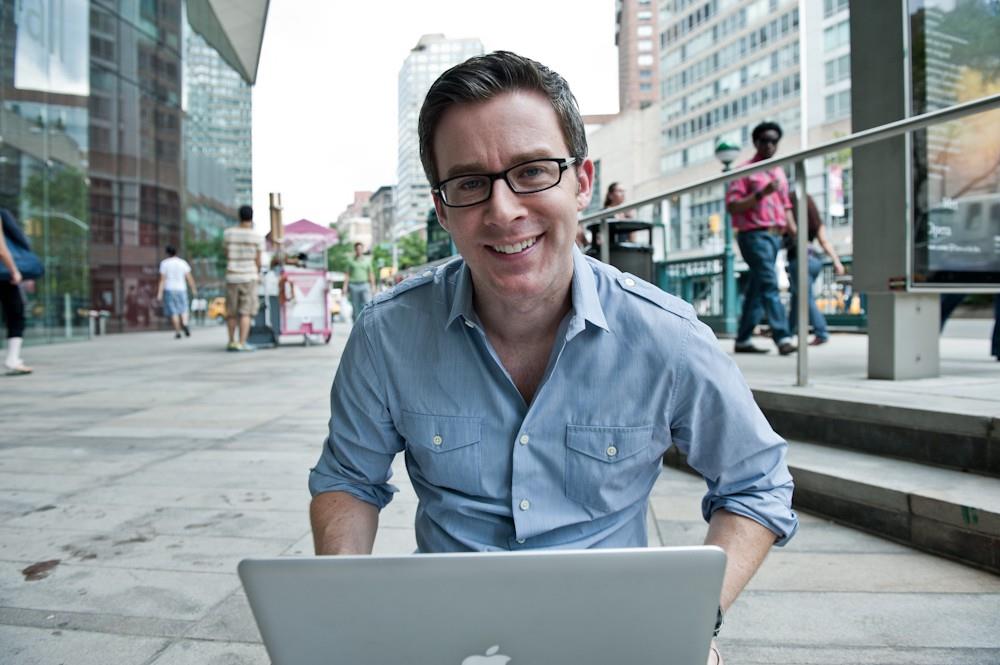
Daniel Sieberg / Photo: Civil
***Discounted registration for DIS 2018 (19-20 March in Berlin) is currently available. Save hundreds of euros on the registration price when you sign up NOW. Secure your place here***
Explain briefly what Civil is and how it came about?
Civil is a decentralised marketplace for sustainable journalism built on blockchain technology, which will launch in late Q1 / early Q2. It will initially exist as a site and app for people to consume content from dozens of newsrooms focused on local, policy and investigative reporting from various parts of the US and globally. And the technological foundation below the surface – blockchain – enables new business models through cryptocurrency, engaged communities through governance structures and a permanence and immutability of content and archives.
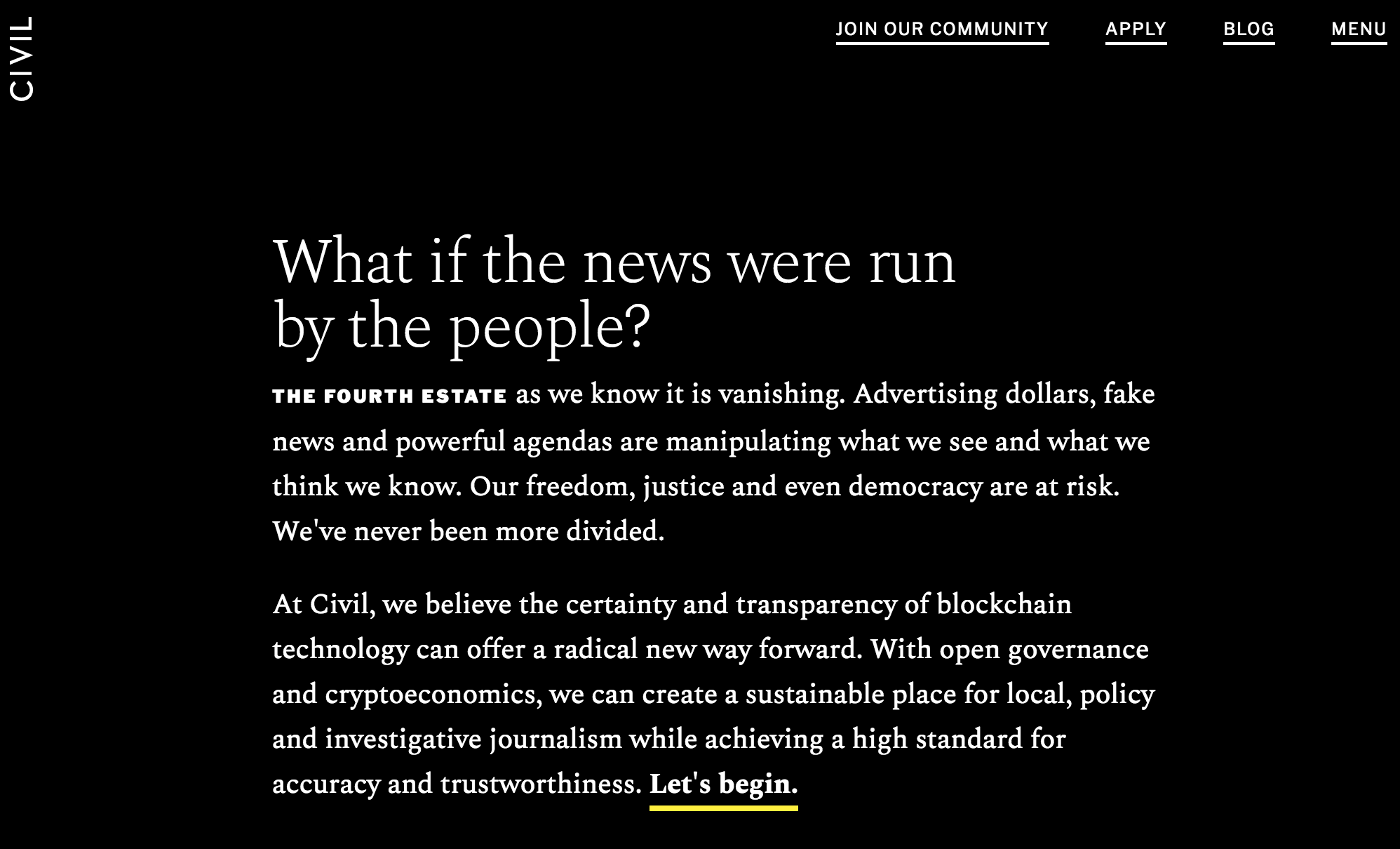 |
What specific problem are you solving?
We know the traditional revenue streams of journalism are broken. Civil aims to turn this broken model on its head. We’re doing so by taking advertisers out of the equation and introducing a new funding model for journalism that makes newsmakers accountable to their readership alone. So not advertisers, not publishers, not billionaire owners; just readers. Civil is not a publication itself, but a platform on which newsmakers can found and run their own, independent newsrooms. We exist to connect the supply side (journalists) with demand (readers), via a self-governing model that ensures trust and accountability. We believe that a cooperatively owned and operated publishing marketplace is the only way to ensure a free, independent and sustainable press.
How does blockchain and cryptocurrency enable you to run the platform?
At a high level, blockchain unlocks two critical features for journalists: self-governance and permanence of archives. The Ethereum blockchain, on which the Civil platform is built, has introduced a new concept, known as the “token economy.” This is Civil’s secret sauce. Instead of mainstream currencies, for which all transactions are processed via a central body (usually a bank) that adds cost and complexity to the process, Civil runs on virtual tokens that facilitate direct, peer-to-peer transactions. Civil tokens, known as “CVL,” can be purchased with traditional currency like USD or cryptocurrencies like Bitcoin and Ether.
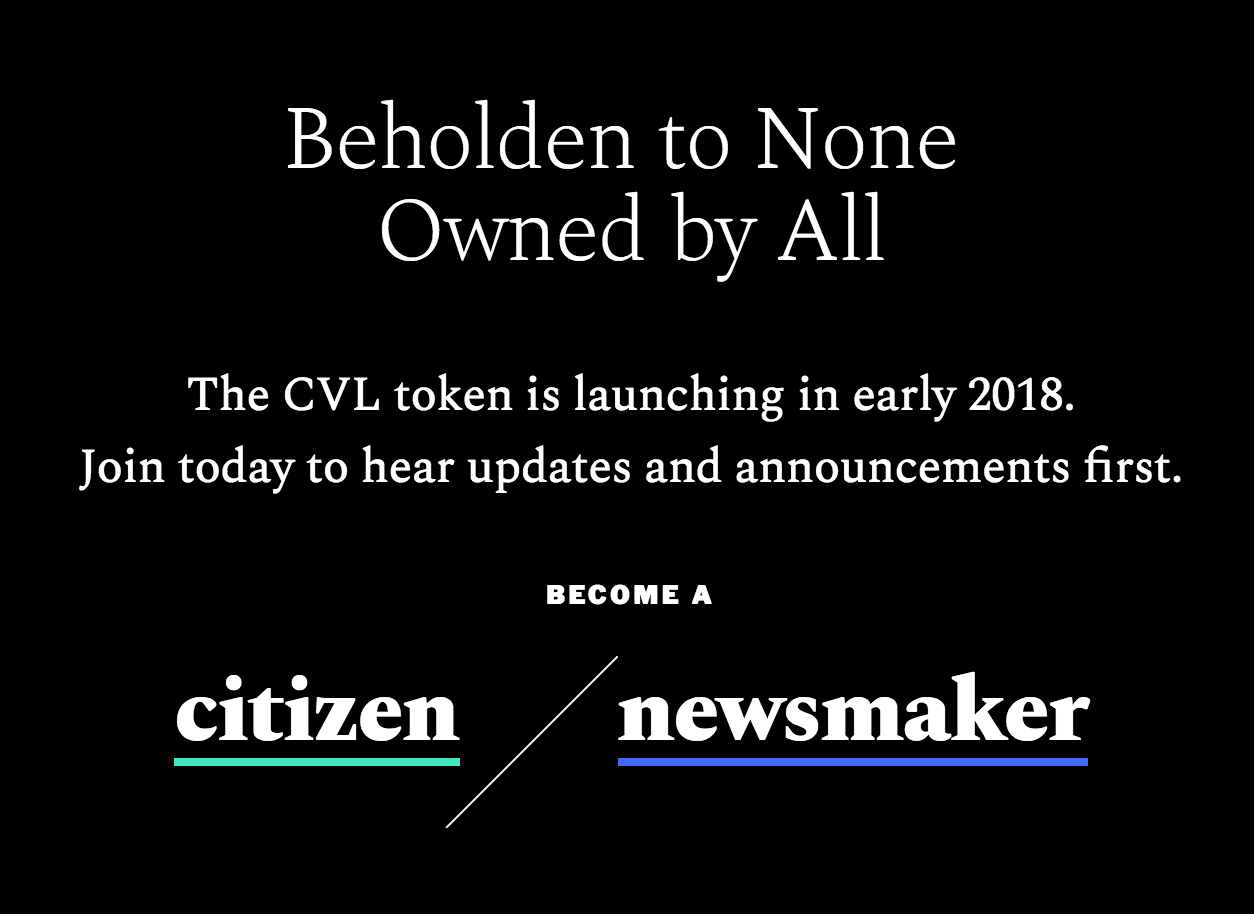 |
It’s the token element that enables Civil to eliminate the middlemen — third-party publishers, advertisers — from the equation while maintaining a reliable, secure model. Token transactions, which power all activity on Civil, occur on the blockchain, essentially a gigantic network of independent computers, which all have access to a master ledger that records token-based transactions. As new transactions occur — becoming a member of a newsroom, microtipping an article, posting a new story — this digital ledger is simultaneously updated across each node. This means that information is stored by the public, not concentrated on a single server controlled by Amazon, Facebook or Google, and thus nearly impossible to alter without achieving the consensus of hundreds of thousands of independent users worldwide.
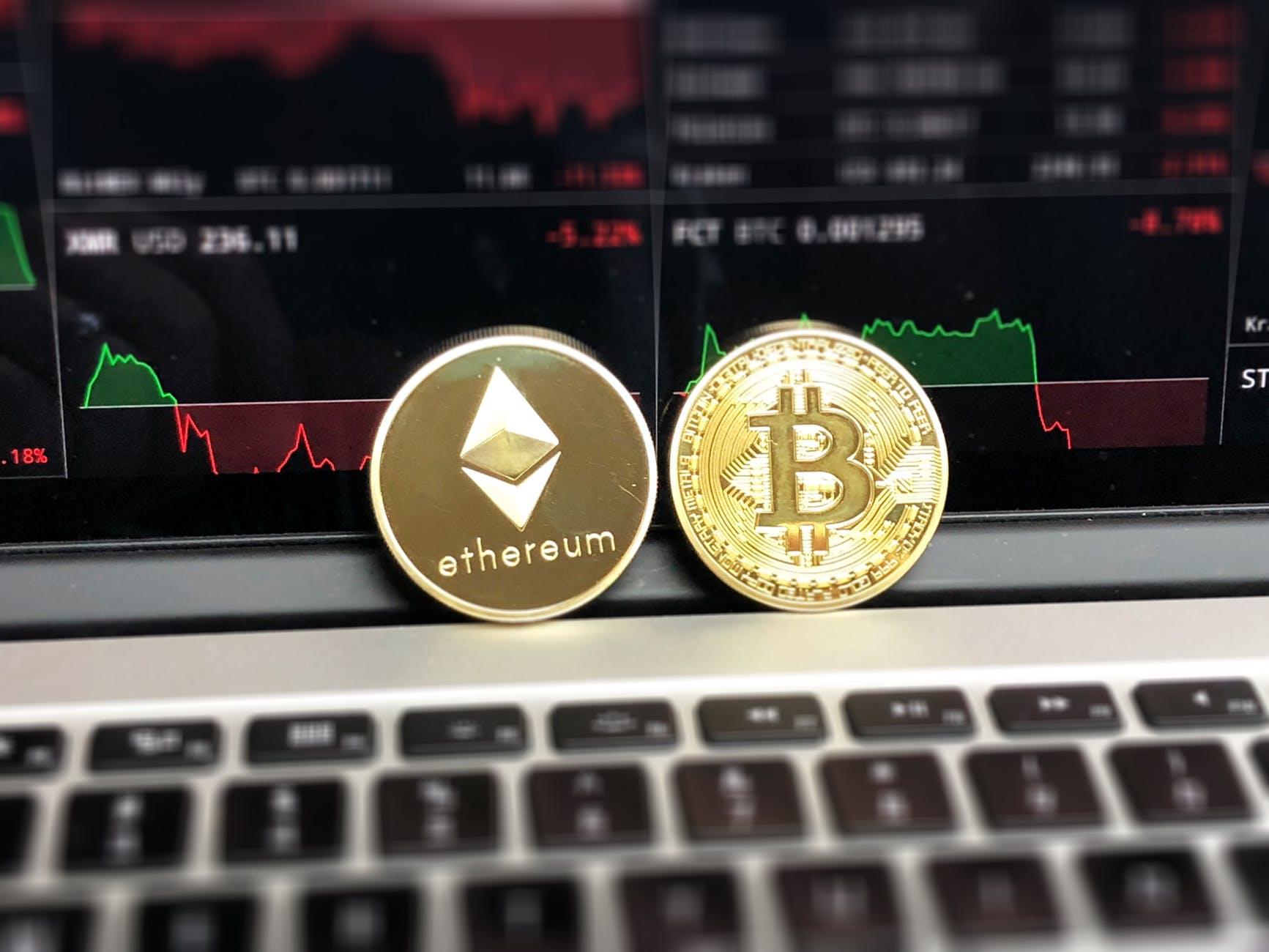 |
How did you go about sourcing journalists? What are you looking for from them?
Great journalism starts with great journalists, and there’s an abundant supply of incredibly talented reporters currently seeking jobs. We want to be a platform that enables a new, more effective operating model — and then get out of the way as they build their own communities and report on stories most relevant to their individual newsroom communities.
To make this model work, we must think like journalists; we need to appreciate and anticipate their greatest needs. As a former journalist myself for 20 years at the likes of CNN, CBS News and the Vancouver Sun, we’ve hired and partnered with journalists from the likes of Politico, DNAinfo, the BBC and others to oversee Civil’s newsroom operations. It’s this team, which I lead for Civil, who have spent the majority of their careers in newsrooms, and that are responsible for providing services and support to journalists, or “newsmakers,” as they found and grow newsrooms on Civil’s platform. We’re committed to giving journalists the resources they need to get initial newsrooms up and running, so we’ve allocated US $1 million to support a “First Fleet.” Our approach is working: we’ve already signed on more than 20 journalists with pedigrees from publications including The New Yorker, LA Times and Time Magazine to run newsrooms on Civil.
Is Civil mainly US focused at the moment or do you have plans to turn it into a global platform?
We are primarily focused on the US for now but also looking to international markets; we’re currently in the process of finalising a few newsrooms on the platform from Asia, Europe and elsewhere and actively looking for more. Eventually we absolutely see Civil as a global platform with all the challenges and opportunities that presents. And in some parts of the world we see a real chance to circumvent censorship or anti-free speech laws through blockchain technology that allows a more peer-to-peer experience.

You are focusing very much on local and legislative journalism to begin with. Do you expect the platform to embrace other types of journalism in the future?
Yes, ideally we’d like to see a whole spectrum of news content live on Civil but in the beginning we specifically wanted to focus on underserved and endangered areas of journalism that we feel are integral to a vibrant and robust society. We’ve defined those as local, investigative and policy, which are three areas that we believe are particularly underserved after two-plus decades of mass media consolidation.
How do you intend to fund the development of Civil? What do you think will be your most significant challenge in the route to monetisation? Are there other revenue sources likely to become available to journalists beyond sponsorship and pledges?
Our current funding of US $5M in cash and services from ConsenSys (the venture capital studio founded by one of Ethereum’s co-founders, Joe Lubin) comprises our First Fleet grants and early operational expenses. Launching the CVL token in the spring will provide the capital to expand our reach into more markets, onboard more newsrooms and potentially assist current ones with a longer runway. We want to invest in quality journalism. Period. As for newsroom revenue, the head of each newsroom will have options depending on how they prefer to build their sustainable model. Our decentralized model means that we grant full autonomy to newsrooms when it comes to making all business (as well as editorial) decisions. It could be charging $5 for a month of podcasts or microtipping for stories or a pledge drive or some combination of everything. We want to give newsrooms options and provide them with as many ways as possible to engage and retain their audiences.
Do you see Civil as unique? Or is this a publishing model enabled by technology that others could copy?
Absolutely. This is about a fundamentally new model for journalism, at a time when it’s desperately needed. Blockchain and cryptocurrency (and more specifically Ethereum) are ripe for development of all kinds and we see some exciting companies moving into this space. We do believe that Civil offers a unique opportunity to combine journalism and blockchain and look forward to helping build a healthy eco-system writ large. That said, we’re also strong proponents of open-sourcing everything we can such that a rising tide lifts all boats. At the end of the day, we not only want journalism globally to survive but to thrive.
Discounted registration for DIS2018 (19-20 March in Berlin) is currently available. Save hundreds of euros on the registration price when you sign up NOW.
- See the speakers so far confirmed
- See the preliminary agenda
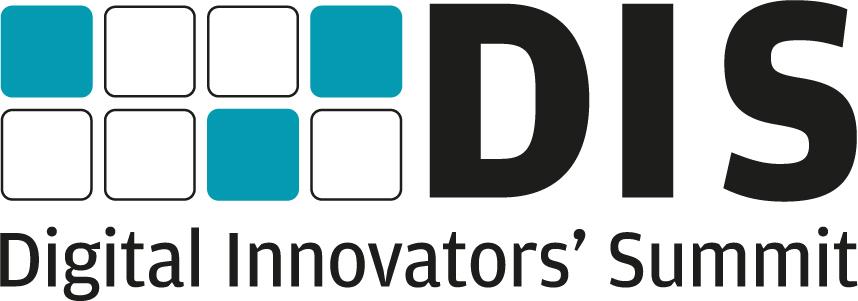
More like this
Blockchain: can it transform the media? Yes, says Burda CTO
Dennis, India Today, Ebner, Future, The Economist and HBR on 2018 Media Tech Trends
Eight key media trends from 2017 that could impact 2018
Five key media tech trends from 2017
Business Insider, Mindshare, and Starcount give their insights into 2018









